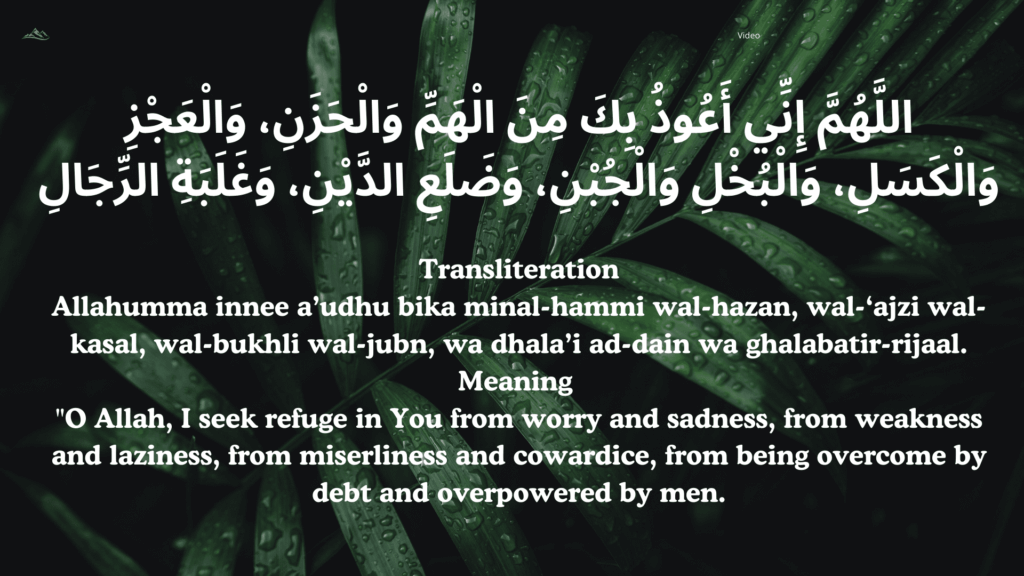Dua & Surah PDF
allahumma inni 'uzubika minal hammi dua, allahumma inni a'udzu bika minal hammi wal hazan, allahumma inni a'uzubika minal hammi wa hazan, allahumma inni auzu bika min al hammi wal hazan, allahumma inni auzubika full dua, allahumma inni auzubika minal hammi wal hazan, dua allah humma inni a'uzu bika minal hammi wal huzan, dua allahumma inni auzubika minal hammi wa hazan
pdfislamicdua
0 Comments
Allahumma Inni Auzu Bika Minal Hammi Wal Hazan Meaning with Transliteration
Allahumma Inni Auzu Bika Minal Hammi Wal Hazan is a powerful supplication (dua) from the Prophet Muhammad (ﷺ), in which we seek refuge in Allah from a range of emotional, mental, and worldly difficulties. We Muslims often recite this dua to seek protection from feelings of sadness, worry, laziness, and other harmful traits.
Allahumma Inni Auzu Bika Minal Hammi Wal Hazan Meaning

Dua in Arabic Text
اللَّهُمَّ إِنِّي أَعُوذُ بِكَ مِنَ الْهَمِّ وَالْحَزَنِ، وَالْعَجْزِ وَالْكَسَلِ، وَالْبُخْلِ وَالْجُبْنِ، وَضَلَعِ الدَّيْنِ، وَغَلَبَةِ الرِّجَالِ
Transliteration
Allahumma innee a’udhu bika minal-hammi wal-hazan, wal-‘ajzi wal-kasal, wal-bukhli wal-jubn, wa dhala’i ad-dain wa ghalabatir-rijaal.
Meaning
“O Allah, I seek refuge in You from worry and sadness, from weakness and laziness, from miserliness and cowardice, from being overcome by debt and overpowered by men.”
Significance and Meaning of dua
This supplication highlights eight aspects of human experience that cause both emotional and physical distress. These include:
- Al-Hamm (Worry): Anxiety about future problems or losses.
- Al-Hazan (Sadness): Grief over past events or missed opportunities.
- Al-‘Ajz (Weakness): Helplessness, especially in fulfilling duties toward Allah.
- Al-Kasl (Laziness): Lack of motivation, despite having the capability to do good deeds.
- Al-Bukhl (Miserliness): Greed or reluctance to give, even when obligated to do so.
- Al-Jubn (Cowardice): Fear of doing what is right, which weakens the heart.
- Dhala’i ad-Dain (Debt Burden): The pressure of being financially overwhelmed by debt.
- Ghalabatir-Rijal (Overpowered by People): The humiliation of being controlled or unjustly overpowered by others.
Hadith Reference
This dua has been mentioned in various narrations. In one, Anas ibn Malik (رضي الله عنه) reported that the Prophet (ﷺ) would regularly seek refuge in Allah through this supplication. The hadith is recorded in Sahih al-Bukhari (nos. 2893, 5425, 6363, 6369) and parts of it are also found in Sahih Muslim (no. 2706)
Allahumma Inni A’uzubika Minal Hammi Wal Hazan Meaning
To understand the full depth of this supplication, here are the terms broken down:
- Al-Hamm: Fear of potential future harm or loss.
- Al-Hazan: Sorrow caused by past experiences.
- Al-‘Ajz: Inability to perform good deeds or obligations due to sin or weakness.
- Al-Kasl: Laziness that prevents you from doing what you should, despite having the means.
- Al-Bukhl: Greed or unwillingness to give to others, even when it is required.
- Al-Jubn: Cowardice, the fear that holds one back from standing for truth and righteousness.
- Dhala’i ad-Dain: The oppressive burden of unpaid debts.
- Ghalabatir-Rijal: Being unjustly controlled or oppressed by others.
Why Recite This Dua?
This supplication is comprehensive as it seeks protection from both emotional and practical difficulties. It helps in developing a strong mental state, free from fear and worry, while also asking for relief from financial struggles and societal pressures. Reciting this dua brings a sense of reliance on Allah and acknowledges human vulnerability.














Post Comment